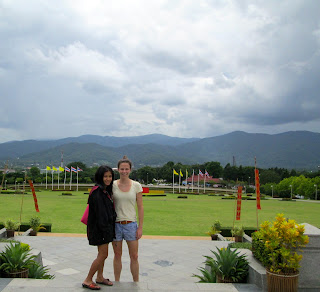Udon Thani is the largest city in Northeastern Thailand, in the heart of the Isan region. The Isan region is comprised of ethnic groups with Lao, Cambodian, and Thai ancestry, with the Lao-speaking population being the largest. The main language is Isan, a dialect of Lao and also similar to the Thai language.
The Udon Thani province is also one of the poorest in the country, and many of these girls are sold off by their families, or choose, to enter the sex industry to earn money for their families. For better or for worse (in my opinion, worse), sex pays, and so Udon Thani, a sleepy town not long ago, has developed rapidly over the last couple of decades as more and more women from the area have left, entered the sex industry in Bangkok, and sent money back to their families. Now, Udon Thani has a large mall that looks like one you would pass in Bangkok:
However, with the money and development, Udon Thani has become a sex city in its own right. I feel its seediness all around me. Next to our hotel is a 5-star looking hotel that fronts Udon Thani's #1 Entertainment Plaza, "Udon Day & Night" (notice the welcoming American flag...):
And all of the other guests at our hotel who I have seen are old male falangs (white foreigners) with young Thai women. YUCK!
Fortunately, Rachel had done her research and so we escaped the seediness of Udon yesterday with a trip to Ban Chiang, Thailand's most significant prehistoric site. Until the discovery of Ban Chiang, historians thought that Thailand was way behind nearby countries, but Ban Chiang gives evidence that the oldest developments of bronze (4000 BC) in the world may have had its origins in Northeastern Thailand.
It was fun to travel with Rachel, who has traveled the world as a photojournalist.
As such, she has a drive to capture the culture and way of life for her work, but does so with a grace that makes the people feel grateful and welcoming rather than intruded upon. So we got to quietly experience awesome slices of village life, from this man painting pottery in the famous Ban Chiang style,
To Thai babies playing in a cool wooden play-pen (I couldn't help but think later, though, would that laughing baby girl one day be sold into the sex industry by her mother? How did this mom, so slender and beautiful with a captivating smile, escape it? This village may be established enough to escape such a desperate life, but hundreds of nearby ones aren't)
And finally, the coolest find of all, some wealthy women in town who were watching their family members and friends plant rice in their rice paddies!
It was such a cool experience to be able to experience such a local activity like this. I have eaten rice all of my life but have never known how it was grown, and now I have witnessed it first-hand. We trekked out to the fields and just relaxed for an hour, watching them work.

The Thais are a happy people and they seemed to love having their picture taken. Although, I am pretty sure the women offered more than once for me to come help them, since Rachel was taking pictures while I was chilling in the shade! But I pointed to my shorts and politely declined - no way was I getting in that mud, especially after my visit from Tomas who is researching parasites in water!
Finally, today, Rachel and I got to experience some Thais worshipping at the local wats (temples) - this felt much more authentic than my previous wat experiences, which consisted of mobs of tourists with a few reverential buddhists in between.
I had a comment on my last post about how I see religion playing into the culture. I respect parts of all religions, but I fundamentally disagree with Buddhism's premise, which is that the "better" you are in this life, the better chance you have of being reincarnated into a better next life until you escape to enlightenment. I disagree with this because I believe that we are all sinners, saved only by the grace of God and the sacrifice of his son, Jesus Christ. I know many reading this blog do not yet believe this, but I pray that all of you will know God's mercy someday!
Back to Buddhism, one cultural effect which I do not identify with is that beggars, prostitutes, and other lowly-lives are seen as having done something wrong in their past life, so they "deserve" the life they now lead. Not only does this obviously lead to a negative self-image, but it also means that Buddhists may not want to associate with beggars/prostitutes for fear of their evil spirits contaminating their better ones. Many Christians also do not associate with beggars or prostitutes out of fear, but Jesus consistently did, so I pray that any Christians reading this will be encouraged to do so!
Another thing which I do not identify with as an American Christian are the food offerings - some delicious looking ones are pictured here - dragon fruit, corn, pork buns, soda, water:
Although I do think that American Christians could gain something from the sacrificial, honoring nature of Buddhism. Like all world religions, there are positive and negative effects of Buddhism. This father teaching his son how to bow to the Buddha statue and make offerings was touching:
I am off to Vientiane, Laos tomorrow, after the Thai director shows me the government shelter here for trafficking victims!


















































